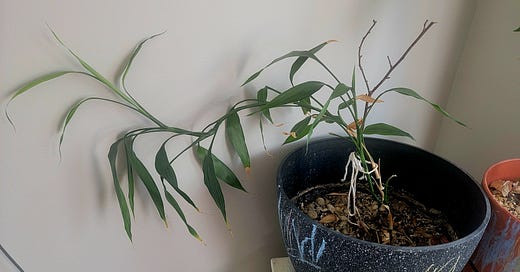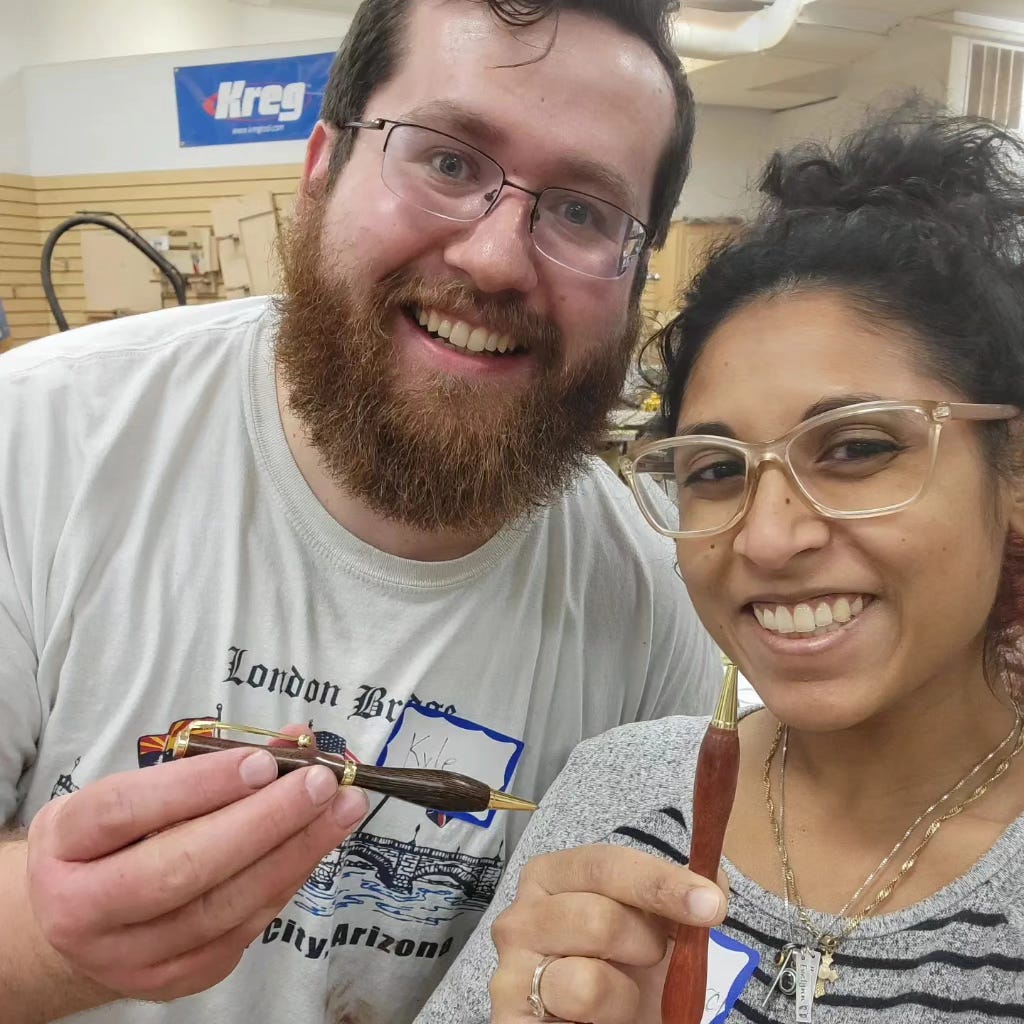My dying house plant is my lucky bamboo that my in-laws gave my husband and me for our first anniversary. I love my husband more than life, but for whatever reason, eighty percent of the bamboo that was in the pot has died, which does not seem like a lucky omen. There is one stubborn stalk still living, leaning over practically sideways, looking for the sunlight.
We have a superb marriage, but I suppose every marriage has its difficult days when you are searching for the light and simply struggling to survive. But, the light is there, and the water, whenever I remember to provide it!
I guess that's just it. The essentials are always there, but it takes intention to use them so the plant can thrive. If you are not mindful of how you tend to the plants, they will struggle and die. Caring for living things is like that.
It seems that caring for children takes less mindfulness. They are so obviously helpless. Plants and spouses are a little more independent. How else do plants grow in the wild? Their roots and leaves seek out sun and water. Although they are at the mercy of the weather, they can still survive. Even if a plant dies, if it had enough time to shed some seeds or if some roots remain unharmed, the plant can be reborn.
What about spouses? How do they thrive? I say spouse specifically, not just people in general, because spouses must thrive within their marital relationship, not just as individuals. These two ways of thriving are entirely different, but perhaps not mutually exclusive.
A photo from a date night over two years ago…shame on us from not doing this more often!
I am no marriage expert, but I do feel happily married. I had my parents to model a healthy spousal relationship when I was growing up. It was not perfect by any means, but I remember my parents each putting the other’s needs first. They provided for each other in different ways through their different roles and expectations in the home. Kyle and I have found a similar rhythm in our family life; we each have found our roles based on our unique gifts and talents that we honed as individuals. As I watched my parents age, their roles changed with their abilities. This solidified for me the idea that your spouse continues to evolve as an individual over time and therefore the spousal dynamic must also adapt. I have already seen this in my husband as he evolved from anxious newlywed to proud father, financial manager, and family handyman, while I accepted the roles of income earner, chore manager, launderer, scheduler, and meal planner (we both share the cooking and cleaning). I fully anticipate that as our family grows and as we grow older, these roles will inevitably change.
Besides the roles spouses have within the family dynamic, they also are someone to their spouse. A relationship mean that in relation to your partner, you are... fill in the blank. With my parents, my mother started as a wife, mother, and household manager, and my father was the financier, handyman, protector - all the classic head-of-the-household type roles. They both worked and had contributing incomes. As my dad's health declined, he could no longer contribute in the ways he always before. He and my mom shared more of the financial management, but almost every other duty fell upon my mom. She went from being a wife and mother to a wife and caretaker. It was never a role she anticipated in her marriage, but my dad had always taken care of her when she needed it, and she accepted that he needed her in a different role. My mom still needed my dad as her emotional support and protector even while his physical role was turned upside down.
In my own marriage, I have noticed the ways we balance each other, and this is how we each have found how we can nourish each other. As a spouse, my husband is an extrovert, but being a stay-at-home parent, he does not have as much conversation with other adults. Particularly on the days I work, as soon as I get done with my charts and I am leaving the office, I can expect his prompt call to catch up on our day, talk about the boys, discuss any interesting cases I had. It seems silly because I am only 15 minutes from home, but that is our "us" time, and he needs that time to replenish his energy stores that were depleted by our children for the past 13 hours. Once I come home, the boys are all over me demanding to play and to share my dinner (even though they already ate). When I am home, showered, and in my PJ's, that is my introvert personal time. I sit quietly, eat dinner, read, and maybe watch something with the family. After a long day of non-stop interpersonal interaction, I can finally be still, recharge, turn my brain off to patients and medicine for the evening. That is how my husband nourishes me at this stage in life. He takes care of the home when I work so I can practice medicine and recharge peacefully when I come home.
Couples must nourish each other and adapt to where they are in life. What happens when they cannot do that? I am sure "cannot" is not accurate, because I think anyone can do almost anything within reason with enough effort. "Will not" may be more accurate. What are the road blocks? The "I want" mentality, when there is a hyper-focus on one's own feelings, there is then a lack of attention and empathy towards the spouse. This is admittedly a hard balance to strike because it is a two-way street, and we all know couples in which one partner clearly takes more than they give. This is where communication comes in.
My plants remind me to water them when their leaves darken, it becomes a little droopy, or the soil is looking more gray than brown. If I am paying attention and care enough whether my plant lives or dies, then I have to water it, no matter how tired or busy I am. Likewise, we must pay attention to the outward signals our spouse is sending. Sometimes this is direct communication: "I need you to fold the laundry today." "Can you please change the lightbulbs in the bathroom?" "I'm feeling really tired tonight, I'm going to empty the dishwasher in the morning." Sometimes the signals are not so direct: tone of voice, demeanor, body language. These more subtle forms of communication are what make our spouse more comparable to our houseplants: we have to pay attention, and we have to assume that the signals being sent are self-expression that we are meant to receive and take action. If we do not pay attention, or we pick up the signals but are too preoccupied trying to send our own, there is a clash. Signals from neither side are received because one or both spouses are only focused on sending their own message. This is a "me first" mentality, which almost assuredly results in a no-win situation. It has taken our entire marriage to tune our communication so that we are both receptive to each other's signals, and it is a full-time job, believe me.
Our provider cracking a coconut for sustenance! Not really, but he had fun doing it
Sometimes one spouse does all the signaling and other only receiving without any reciprocation. This also is a lack of balance. Even our houseplants confer some reciprocation: they beautify our home, clean the air, maybe yield some fruits or flowers. A partner should be able to provide much more when they are properly attended.
Obviously my husband means far more to me than our lucky bamboo plant. Despite my poor gardening skills, part of the plant is still thriving, so maybe that still makes it lucky. It has not yet given up searching for whatever sunlight and water I can provide, and it still exists not just to be a good omen of a happy marriage, but also as a reminder that I am lucky to have a partner who nourishes me, so I should probably pay him more attention than I do my houseplants.







